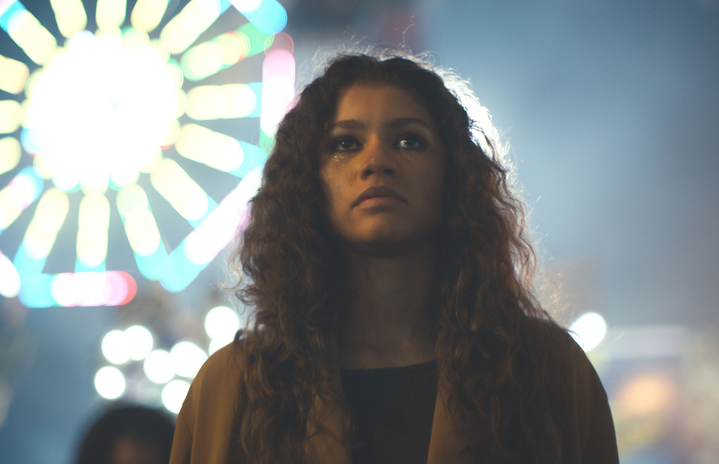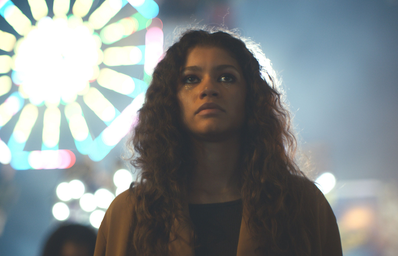Note: This article addresses spoilers and discusses mature topics.
HBO’s Euphoria—starring Zendaya as Rue Bennett—has been renewed for a third season after the viewership of season two almost doubled that of season one, with episode one drawing 13.1 million viewers. By releasing a new episode each Sunday night, Euphoria has its fans hooked: many TikTok and Twitter users’ feeds are inundated with reflections and theories for future episodes the day following an episode’s release. The visually striking teen drama covers a range of sensitive and mature topics, from heavy drug use to explicit sexual content, to capture the struggles and complexities of navigating relationships and growing up in this generation.
In light of Euphoria’s latest episode, “Stand Still Like the Hummingbird”, viewers have reflected on the episode’s graphic nature, using it to confirm or adapt the beliefs they have about the show’s depiction of addiction and drug use. Zendaya’s intense performance highlights the measures a drug addict will take to chase a high: destroying relationships, stealing, and running from the police were some of Rue’s efforts to avoid the painful emotions that accompany a withdrawal.
Zendaya posted a trigger warning on her Instagram the night of the episode’s release. She reminded her audience that the show is intended for mature audiences, noting that season two is “deeply emotional and deals with subject matter that can be triggering and difficult to watch.” Episode five showcased raw and heavy themes, ultimately depicting how addiction can bring out the worst version of someone.
The Critics’ Concerns
Various critics and fans have criticized the show’s portrayal of substance abuse; one major concern claims that Euphoria glorifies the issue through visually-appealing scenes of drinking and ingesting substances at high school parties. Critics hold the argument that the harsh reality of addiction is masked through the cinematography and may encourage struggling teenagers to seek drugs as an appropriate coping mechanism.
The topic of addiction in Euphoria has made its way to notable figures, too. A representative from D.A.R.E.—one of the nation’s distinguished educational programs preventing drug use—argued that the show chooses to “misguidedly glorify and erroneously depict high school student drug use […] as common and widespread in today’s world,” in a statement to TMZ.
Addressing the Backlash
Zendaya responded to the concerns, telling Entertainment Weekly that Euphoria is not a “moral tale to teach people how to live their life,” but the feeling behind it is to “help people feel a little bit less alone in their experience and their pain”. She reflected on her acting in episode five, telling the news source that “It was a very tough day […] I still have some scars on my legs, and got quite a few bruises.”
In another interview with Entertainment Weekly, producer Sam Levinson shared his thoughts on the controversial nature of his show. Levinson discussed how he became involved with HBO and his process of capturing the essence of teenage life for some: “I just write myself and what I was feeling and what I was going through when I was younger and I was dealing with addiction,” he explained. Levinson worked to create a character that dealt with some of the same struggles he endured.
Continuing Tensions: Traumatic or Groundbreaking?
A primary reason Euphoria has garnered massive viewership since its release is through the show’s combination of fantasy and realism, coupled with the soundtrack, cinematography, and dramatic acting skills of the characters. With a rating of 87% on Rotten Tomatoes, Euphoria’s creative risks and mature themes add to the rollercoaster of emotions its audience experiences.
The show’s most recent episode has fueled major discussion on social platforms and publications alike, with viewers stressing that there must be a stronger content warning than HBO’s warning at the start of each episode. Refinery 29 published an article reflecting on the reason many viewers are enthralled by Rue’s performance. The author explains that the show allows viewers to “see another side and another experience that’s completely foreign and tangentially feel the adrenaline rush that comes with it.” However, this is not the case for viewers whose past experiences align closer with Rue’s—those who have struggled with addiction and find the themes triggering.
The combined efforts of HBO and cast members like Zendaya serve as reminders that the themes discussed are not meant for everyone to absorb. Viewers who find the content too graphic or triggering should advise against watching for the sake of their mental health. Regarding the controversy surrounding drug use, Euphoria’s latest episode captured the darkest moments of living with a drug addiction, making viewers cringe and feel the pain that Rue felt. Ultimately, the episode showed its audience that the behaviors Rue exhibited are not glorified and depict the sad reality that many drug addicts face. Euphoria’s future episodes will likely continue this portrayal, making it important for viewers to be mindful of their emotional health when watching.


